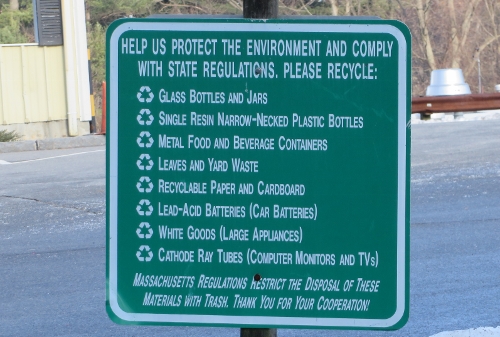Above: Starting in September, residents who previously were shut out of recycling at the Transfer Station can purchase a discounted sticker for access to that area. (Photo by Beth Melo)
Southborough Wicked Local covered some stories worth sharing this week.
At Town meeting, voters supported allowing discounted limited access stickers for the Transfer Station – to allow use of the recycling & swap shop area.
Board of Selectmen made it official this week, though at a higher rate than initially requested. The paper saved me some time by writing up what you need to know about the new rules and regs.
SWL also shared news on a big construction project in town that will make one of our non-profits even bigger. (The good news is, it’s one with a good record for generous PILOT donations to the town – Payment in Lieu of Taxes.)
And, though the news isn’t specific to Southborough, potential cuts to Kindergarten grants are relevant as our school budget (not to mention how the administration grapples with parents’ requests to fund “Free” full day kindergarten.)
Southborough: Transfer station fees remain the same:
The fees to dump trash at the transfer station next year will stay the same as this year, but the town is adding a recycling-only permit after a resident urged the move at Town Meeting.
At Tuesday night’s selectmen meeting, Karen Galligan presented the revised transfer station rules and regulations. For non-seniors, the fee is $200 by mail and $220 walk-in before Sept. 15. After Sept. 15, the fee increases to $250.
For residents over 65, the first permit is free.
“I didn’t change much,” Galligan said. “I kept the rates the same.”
The only major change includes offering a recycling-only permit, which was petitioned by Jack Barron and passed at Town Meeting in April. The permit will be $50 by mail, $60 walk-in before Sept. 15. After Sept. 15, the increases to $75.
The new permit includes access to the recycling section and swap shop. (read more)
Southborough: $10M expansion will feature autism center:
The New England Center for Children on Rte. 9 is expanding after a successful two-year $10 million capital campaign.
Plans call for tearing down an existing building and putting up a new three-story 33,000-square-foot addition for what will be called the Autism Institute that will host research and training. Existing space will be renovated into a 10,000-square-foot student center, according to Michael Downey, chief financial officer. (read more)
Looming cut to kindergarten grants alarming:
[Editor’s Note: At last week’s School Committee Meeting, Superintendent Christine Johnson updated the committee on this issue.
Earlier this spring, they learned the Kindergarten grants might be cut. Subsequently, there was hopeful news about it being reinstated for this year, to give schools time to plan ahead. Now this year’s funds are in jeopardy again.
In a previous meeting, Johnson told the committee that what’s at stake is $66,000 they had counted on through the grant for the coming year. Last Wednesday, she clarified that money is used to fund several teacher’s aids positions.
As of last week, the committee was following Representative Carolyn Dykema’s advice to keep sending in letters lobbying for the grant.
Now, here’s SWL’s coverage of the issue from a regional perspective.]
A drastic cut in funding proposed for the state grants that enrich full-day kindergarten has imperiled jobs in some local school districts. . .
The Senate’s $38.1 billion budget, passed May 22, would fund the grants at $1 million in fiscal 2016, translating to a “painful” $17.6 million cut for the more than 100 communities and school districts that rely on the grants to supplement their full-day kindergarten programs, according to the Massachusetts Municipal Association.
The House opted to level-fund the program at $18.6 million.
The Legislature’s conference committee has nearly finished hashing out the disparities between the two budgets and expects to release a compromise bill within the next three weeks. It’s unclear what action the committee will take on the grants.
Gov. Charlie Baker’s budget would have eliminated all funding for the program, jeopardizing full-day kindergarten programs throughout Massachusetts.
In recent years, more school districts have started offering free full-day kindergarten, even as coming up with the funding to do so has challenged them. . .
Districts eligible for Kindergarten Expansion Grants must double the kindergarten schooling they provide. . .
The grants come in two categories. Transition Grants are awarded to districts moving part-time kindergarten classrooms to full-day. And Quality Full-Day Grants fund initiatives aimed at strengthening existing full-day programs, such as professional development; last year, 169 such grants were awarded totaling $23.8 million.
Over the years, the funding for the grants has fluctuated. But the previous three fiscal years have seen a consistent decrease. And if the Senate budget stands, next fiscal year’s cut would represent the most significant drop in funding since the state began offering the grants in 2001. (read more)


